Security police officers are people employed by or for a governmental agency or corporations that own mass private property to provide police and security services to those properties.
Special police usually describes a police force or unit within a police force whose duties and responsibilities are significantly different from other forces in the same country or from other police in the same force, although there is no consistent international definition. A special constable, in most cases, is not a member of a special police force (SPF); in countries in the Commonwealth of Nations and often elsewhere, a special constable is a voluntary or part-time member of a national or local police force or a person involved in law enforcement who is not a police officer but has some of the powers of a police officer.
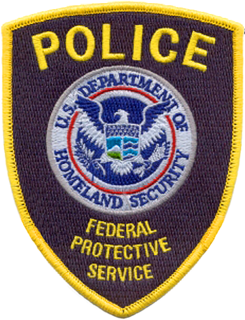
The Federal Protective Service (FPS) is the uniformed police division of the United States Department of Homeland Security (DHS). FPS is "the federal agency charged with protecting and delivering integrated law enforcement and security services to facilities owned or leased by the General Services Administration (GSA)"—over 9,000 buildings—and their occupants.

The Boston Police Department (BPD), dating back to 1854, holds the primary responsibility for law enforcement and investigation within the American city of Boston, Massachusetts. It is the oldest municipal police department in the United States. The BPD is also the 20th largest law enforcement agency in the country and the largest in New England.
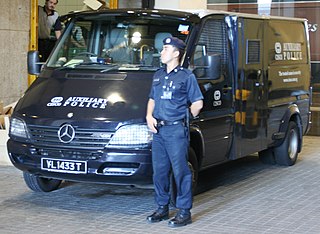
Auxiliary police, also called special police, are usually the part-time reserves of a regular police force. They may be armed or unarmed. They may be unpaid volunteers or paid members of the police service with which they are affiliated. The police powers auxiliary units may exercise vary from agency to agency; some have no or limited authority, while others may be accorded full police powers.
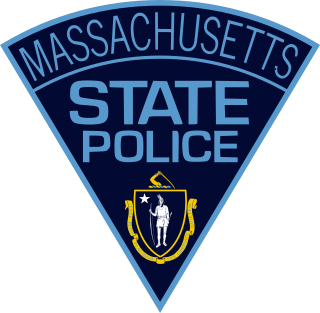
The Massachusetts State Police (MSP) is an agency of the Commonwealth of Massachusetts' Executive Office of Public Safety and Security, responsible for criminal law enforcement and traffic vehicle regulation across the state. At present, it has 2,187 troopers, 1,500 of them being uniformed troopers, and 540 civilian support staff—making it the largest law enforcement agency in New England. The MSP is headed by Colonel Christopher Mason.
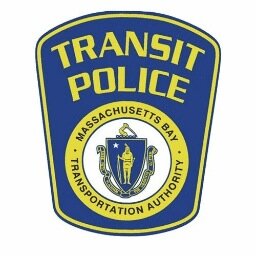
The Massachusetts Bay Transportation Authority Police is a police force which has primary jurisdiction on Massachusetts Bay Transportation Authority (MBTA) property and vehicles in each of the 175 cities and towns within the MBTA. The department has grown to an authorized strength of 266 officers and 10 civilians. The majority of the MBTA Police Department's efforts are focused on patrol in Boston and surrounding communities. The department patrols and protects the 5 subway lines to include the Silver Line, 13 commuter rail lines, 4 passenger ferry routes, 181 bus routes and The Ride paratransit system in Massachusetts communities.

The United States Department of Veterans Affairs Police is the uniformed law enforcement service of the U.S. Department of Veterans Affairs, responsible for the protection of the VA Medical Centers (VAMC) and other facilities such as Outpatient Clinics (OPC) and Community Based Outpatient Clinics (CBOC) operated by United States Department of Veterans Affairs and its subsidiary components of the Veterans Health Administration (VHA) as well as the National Cemetery Administration (NCA) and the Veterans Benefits Administration (VBA) respectively. The VA Police have several divisions and operate separately but alongside the VA Law Enforcement Training Center under the umbrella of the Office of Security and Law Enforcement. The primary role of VA Police is to serve as a protective uniformed police force in order to deter and prevent crime, maintain order, and investigate crimes which may have occurred within the jurisdiction of the Department or its federal assets. Some cases are investigated in conjunction with Special Agents from the Office of the Inspector General.
Company police, also called private police, are privately paid law enforcement officers who work for private security companies or private military companies rather than a municipal, county, state, or national agency.

Police departments in the University of California system are charged with providing law enforcement to each of the system's campuses.
Private police or special police are law enforcement bodies that are owned or controlled by non-governmental entities. Additionally, the term can refer to an off-duty police officer while working for a private entity, providing security, or otherwise law enforcement-related services. These officers do have power to uphold the laws under the discretion of the private company.

Airport police units are a security police agency assigned to perform law enforcement functions at airports. They provide a wide range of law enforcement duties and responsibilities including patrol, investigation, traffic flow management, and control and response to airport emergencies. Airport police provide enhanced safety to airport employees, and to passengers. Officers can be found at security gates, throughout the terminal area, and around the airport’s perimeter.

The Boston University Police Department (BUPD) is the primary law-enforcement agency of Boston University and provides services to more than 41,000 students, faculty, and staff on 132 acres (0.53 km2) of University property and surrounding streets. Its headquarters are located on Harry Agganis Way adjacent to Nickerson Field, in what was once the Braves Field ticket office.
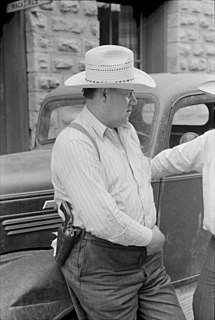
In the United States, a sheriff is an official in a county or independent city responsible for keeping the peace and enforcing the law. Unlike most officials in law enforcement in the United States, sheriffs are usually elected, although some states have laws requiring certain law enforcement qualifications of candidates. Elected sheriffs are accountable directly to the citizens of their county, the constitution of their state, and ultimately the United States Constitution.

A security guard is a person employed by a government or private party to protect the employing party's assets from a variety of hazards by enforcing preventative measures. Security guards do this by maintaining a high-visibility presence to deter illegal and inappropriate actions, looking for signs of crime or other hazards, taking action to minimize damage, and reporting any incidents to their clients and emergency services, as appropriate.

The New York City Health and Hospitals Police (NYHP) is responsible for provide on-site security services at the 18 NYC hospitals and clinics operated by the New York City Health and Hospitals Corporation (HHC) and to enforce state and city laws at those facilities.
The Massachusetts Institute of Technology Police Department is the police agency charged with providing law enforcement to the campus of the Massachusetts Institute of Technology. The 168-acre campus extends over 1 mile (1.6 km) along the northern bank of the Charles River basin.
Many municipalities of Massachusetts have their own police departments, as do many colleges and universities. Though most county governments have been abolished, each county still has a Sheriff's Department which operates jails and correctional facilities and service of process within the county.
The Boston Police Patrolmen’s Association (BPPA) is the largest of the police unions representing police officers in the Boston Police Department. As of 2020, it represents approximately 1,500 officers.












